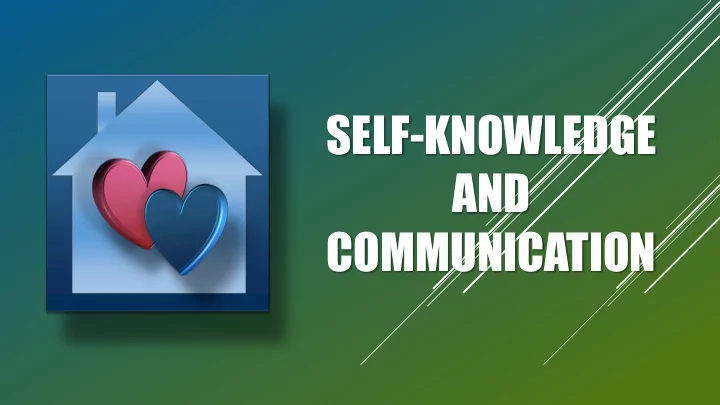

SELF-KNOWLEDGE AND COMMUNICATION
“You formed me in my inmost being. You knit me in my mother’s womb. I praise you, because I am wonderfully made. Wonderful are all your works! My very self you know.” PSALM 139:13-14
WHO AM I? NURTURE NATURE TRUE SELF
WHO AM I? 1. NATURE: CHOLERIC MELANCHOLIC Temperament Theory Natural Dispositions ▪ Four Temperaments ▪ Long tradition within ▪ the Catholic Church 2. NURTURE SANGUINE PHLEGMATIC 3. TRUE SELF
TEMPERAMENT INVENTORY
KEY POINTS TO REMEMBER: THERE ARE STRENGTHS AND SUSCEPTIBLITIES FOR EACH TEMPERAMENT. UNDERSTANDING AND APPRECIATING DIFFERENCES CAN BUILD INTIMACY
SENSE OF ATTACHMENT SENSE OF SELF WHO AM I? ROLES AND STYLE WORTH EXPECTATIONS EXPERIENCE CHARACTER AND IMAGE OF GOD 1. NATURE FORMATION EXPRESSION OF EMOTION 2. NURTURE: The influences of our environment , especially HOW WE HOW WE HOW WE RELATE TO INTERPRET DEFEND our FAMILY OF OTHERS THINGS OURSELVES ORIGIN on our development of self. HOW WE 3. TRUE SELF HOW WE FIND UNDERSTAND MEANING IN THE MEANING LIFE OF LOVE
Become all that God created you to be through the Life of Virtue WHO AM I? Prudence Justice Fortitude 1. NATURE 2. NURTURE 3. TRUE SELF: The Temperance FAITH HOPE beautiful idea of you in the Mind of God Virtue = Habitual and LOVE firm disposition to do the good.
“Though made of body and soul, man is one…For by his interior qualities he outstrips the whole sum of mere things. He plunges into the depths of reality whenever he enters into his own heart; God, who probes the heart, awaits him there; there he discerns his proper destiny beneath the eyes of God.” Gaudium et Spes, no. 14
PART TWO: COMMUNICATION Our Relationship Needs Some TLC Skills for Building a Solid Marriage
DESTRUCTIVE PATTERNS OF - Escalation COMMUNICATION - Withdrawal - Criticism - Sarcasm - Defensiveness - Not Listening - Vicious Cycles - Blaming - Provoking - Using Absolutes
EFFECTIVE COMMUNICATION Learned Skill Requires: 1. Intention 2. Effort 3. Practice
TLC STEP 1: Effective T alking STEP 2: Effective L istening EXAMPLE: SWITCH: 1. Husband Talks 1. Wife Talks STEP 3: Effective 2. Wife Listens 2. Husband Listens C hecking 3. Wife Checks 3. Husband Checks
STEP 1 1. Make a 2. Begin with EFFECTIVE TALKING complaint, not an underlying a criticism positive 4. 3. Avoid Communicate generalizations in “Bite - Size” chunks 5. Use “I” statements
STEP 2 1 . Listen to EFFECTIVE LISTENING understand 2 . Be Empathetic 3. Understanding “If we’re paying $150 a month for cell phones, is not I figure you’ll pay more attention to what I’m saying!” agreement
STEP 3 EFFECTIVE CHECKING 1. Articulate understanding 2. Ask your spouse if you understand him/her correctly 3. Be open to correction 4. Get clarification if you do not understand 5. Remember to switch roles!
OBSERVE TLC IN ACTION !
7 PRINCIPLES OF EFFECTIVE COMMUNICATION 1. Listen and express yourself effectively 2. Be curious rather than judgmental. 3. Be thoughtfully responsive rather than emotionally reactive.
7 PRINCIPLES OF EFFECTIVE COMMUNICATION 4. Be aware that your interpretation does not necessarily reflect your spouse’s intent. 5. Be aware pf interactive patterns in your relationship. 6. Be aware of timing! 7. Persevere!
Recommend
More recommend